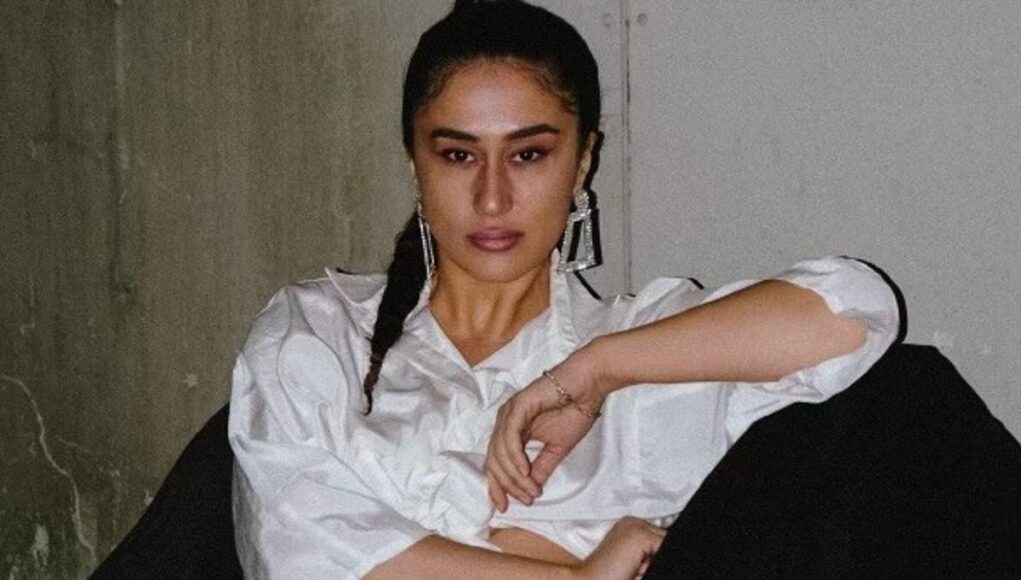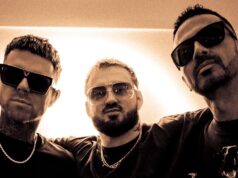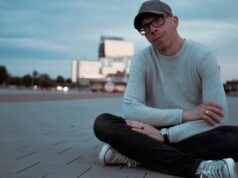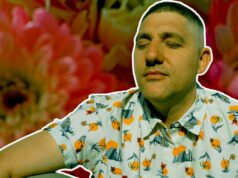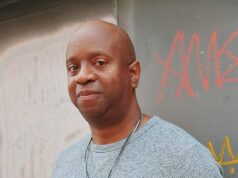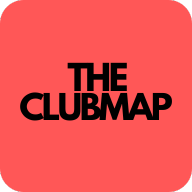Kannst du uns etwas über deinen Hintergrund erzählen und wie du mit der Musik angefangen hast?
Ich bin vor fünfzehn Jahren wegen Studiums aus der Türkei nach Deutschland ausgewandert. Damals habe ich kein Deutsch gekonnt, und mein Studium war ebenfalls auf englisch. Seit sieben Jahren unterrichte ich aber nun sogar Deutsch in Integrationskursen. Wollte aber eigentlich nie eine Lehrerin werden, deshalb strebe ich seit sechs Jahren eine Musikkarriere an.
Wer sind deine größten musikalischen Einflüsse, sowohl innerhalb als auch außerhalb der elektronischen Musik? Wie haben diese Einflüsse deinen Sound und deine Herangehensweise an das Musikmachen geprägt?
Zu meiner größten musikalischen Einflüssen gehört in erster Linie die türkische Volksmusik. Meine Eltern stammen aus einem Dorf in Anatolien. “Türkü” ist die Bezeichnung für ein türkisches Volkslied und das habe ich als Kind jeden Tag gehört. In zweiter Linie ist es afrikanische Musik, wie Afro House und Afrobeats. Diese habe ich erst später im Leben entdeckt, aber ich finde die Ähnlichkeiten zwischen türkischen und afrikanischen Rhythmen faszinierend. Zur Zeit liebe ich es, diese beiden Stilrichtungen im House-Musik-Format zusammenzubringen.
Kannst du uns deinen kreativen Prozess beim Schreiben und Aufnehmen eines neuen Songs erläutern? Wie fängst du typischerweise einen neuen Track an, und auf welche Schlüsselelemente oder Techniken konzentrierst du dich bei der Entwicklung?
Ich produziere hauptsächlich Mashups. Der Prozess beginnt mit einem Song, von dem ich besessen bin und den ich nie müde werde, ihn tagelang anzuhören. Zu diesem Zeitpunkt ist es immer noch ein Rätsel, was aus diesem Stück sein wird. Ich greife zu meinem Laptop und meinem Pioneer DJ Controller und finde in meiner Bibliothek einen House-Beat, der zu dem Song passt, der mich fasziniert, und die Magie beginnt, sich von selbst zu erschaffen.
Dein neuestes Projekt gewinnt gerade an Fahrt, kannst du uns etwas darüber erzählen? Wie ist dieses Projekt entstanden und was hat dich dazu inspiriert, es zu machen? Wie bist du bei der Entwicklung vorgegangen und was unterscheidet es deiner Meinung nach von deinen bisherigen Arbeiten?
Ich bereitete mich für dieses Projekt ungefähr eineinhalb Jahre vor und seit sechs Monaten lege ich nun in Berliner und Istanbuler Clubs auf. Dieses Projekt entstand als Reaktion auf mein vorheriges Projekt. Ich produzierte vorher Deutschrap, weil Deutschrap mir damals beim Deutschlernen viel geholfen hatte, ich wollte aus Dankbarkeit dem Kultur etwas zurückgeben.
Was war der Höhepunkt deiner bisherigen Karriere? Hast du irgendwelche guten Tour-Geschichten auf Lager? Und welches war der schlimmste Job den du jemals hattest?
Der Höhepunkt meiner bisherigen Karriere war, als eines meiner Online-Rap-Battle-Videos viral ging. Auf diese Weise hatte ich die Möglichkeit, die Szene besser kennenzulernen kam aber zu dem Schluss, dass es nichts für mich ist. Das Schlimmste war die Rolle, die einer Frau zugeschrieben wird, wenn sie auf Deutsch rappt, und die Art und Weise, wie sie von den meisten Hörern und Produzenten dieses Genres behandelt wird.
Als ich mit Musik startete, sagte mir jemand: „Es macht einen großen Unterschied, wer deine Musik hört und mit wem du zu tun hast”. Damals hatte ich es nicht verstanden. Heute schon. Ehrlich gesagt war dies der Hauptgrund, warum ich mich für die elektronische Musikszene entschieden habe. Ich liebe die gegenseitigen Respekt und die Liebe in der elektronischen Musikszene.
Kannst du uns etwas über kommende Projekte oder Kollaborationen erzählen, die du in Arbeit hast? Gibt es irgendwelche neuen Richtungen oder Klänge, die du in deiner Musik gerade erforschst?
Ich gehöre zum Berliner Kollektiv “Technotürken”. Wir veranstalten vier großen Events im Jahr. Das nächste wird am 1. Mai 2024 stattfinden. Abgesehen davon habe ich ein eigenes Mashup-Projekt. Ich arbeite an fünfzehn Mashups, die ich am Ende in einem DJ-Set zusammenbringen werde.
Welche Botschaft hoffst du als Musiker durch deine Musik zu vermitteln? Zu welchen Themen oder Ideen kehrst du in deiner Arbeit immer wieder zurück?
Ich finde die ethnischen Elemente bereichern die elektronische Musikszene. Meine Botschaft besteht darin, diese Reichtümer in verschiedenen Teilen der Welt zu vereinen, zu präsentieren und zu feiern.
Kannst du uns etwas über die Herausforderungen erzählen, denen du in deiner Karriere begegnet bist, und wie du sie überwunden hast? Was würdest du raten, um sich als Profi durchzusetzen?
Die größte Herausforderung ist für mich die Zeit und die stabile Kontinuität der Produktivität. Es ist kein Geheimnis, dass man als DJ und Produzent oft in einer anderen Branche arbeiten muss, um die finanzielle Freiheit zu wahren. An diesem Punkt ist es sehr wichtig, dass Sie Ihre Ziele weiter verfolgen und nicht vergessen, warum Sie sie erreichen wollen. Außerdem ist es wichtig, mit Geld und Zeit klug umzugehen.
Wie handhabst du Musikwünsche? Und was tun, wenn das Equipment streikt?
Auf meinen Parties kommt niemand auf mich zu, um einen Liedwunsch zu äußern. Ich bin froh, dass das nicht passiert. Ich verstehe mich als Kuratorin von Liedern und meine Shows als Ausstellungen. Das sehen auch die Menschen vor Ort so und respektieren den Ablauf des Sets. Und wenn das Equipment streikt, gebe ich mein Bestes mit dem, was ich zur Verfügung habe.
Beschreibe deinen Sound jemandem, der dich noch nie gehört hat. Und was würdest du machen, wenn du kein Musiker wärst?
Mein Sound klingt wie eine entschlossene Einwandererin, die das Beste aus ihrer Herkunft und ihrem Aufenthaltsort zusammenbringt.
Was ist die wichtigste Musikequipment-Erfindung aller Zeiten – und warum?
Die Pioneer and Ableton Controller sind die besten Musik-Equipment-Erfindungen aller Zeiten. Controller sind fantastische Instrumente, mit denen Sie jede Art von Sound auf Ihre ganz eigene Art und Weise nähen und formen können.
Can you tell us a little about your background and how you started with music?
Fifteen years ago I moved from Turkey to Germany to study. I didn’t know any German back then, my studies were also in English. I have been teaching German in integration courses for seven years. But I never really wanted to be any kind of teacher, so I’ve been pursuing a music career for six years now.
Who are your biggest musical influences, both inside and outside of electronic music? How have these influences shaped your sound and approach to making music?
One of my biggest musical influences is primarily Turkish folk music. My parents come from a village in Anatolia. “Türkü” is the name for a Turkish folk song and I heard it every day as a child.
Secondarily is African music, such as Afro House and Afrobeats. I only discovered this later in life. I find the similarities between Turkish and African rhythms fascinating. Right now I’m loving bringing these together in a house music format.
Can you walk us through your creative process when writing and recording a new song? How do you typically start a new track, and what key elements or techniques do you focus on when developing it?
I mainly produce mashups. The process begins with a song that I am obsessed with and never tire of listening to for days. At this point it is still a mystery what will become of this piece. I grab my laptop and my Pioneer DJ controller and find a house beat in my library that fits the song that intrigues me and the magic begins to create itself.
Your latest project is just gaining momentum, can you tell us a little about it? How did this project come about and what inspired you to do it? How did you go about developing it and what do you think makes it different from your previous work?
I prepared for this project for about a year and a half and I’ve been DJing in Berlin and Istanbul clubs for six months. This project was created in response to my previous project. I produced German rap because German rap had helped me a lot with learning German at the time. I wanted to give something back to the culture out of gratitude.
What has been the highlight of your career so far? Do you have any good tour stories? And what was the worst job you’ve ever had?
The highlight of my career so far was when one of my online rap battle videos went viral. In this way I had the opportunity to get to know the scene better and came to the conclusion that it wasn’t for me. The worst thing was the role assigned to a woman when she raps in German and the way she is treated by most listeners and producers of this genre.
When I first started with music, someone told me, „It makes a big difference who listens to your music and who you interact with.“ I didn’t understand it then. I do now. Honestly, that was the main reason I chose the electronic music scene. I love the mutual respect and love in the electronic music scene.
Can you tell us about any upcoming projects or collaborations you have in the planning? Are there any new directions or sounds you are currently exploring in your music?
I belong to the Berlin collective “Technotürken”. We host four major events a year. The next one will take place on May 1, 2024. Apart from that, I have my own mashup project. I’m working on fifteen mashups that I’ll eventually bring together in a DJ set.
As a musician, what message do you hope to convey through your music? What themes or ideas do you return to again and again in your work?
I think the ethnic elements enrich the electronic music scene. My message is to unite, showcase and celebrate these riches in different parts of the world.
Can you tell us about the challenges you have faced in your career and how you overcame them? What advice would you give to establish yourself as a professional?
The biggest challenge for me is time and the stable continuity of productivity. It’s no secret that as a DJ and producer you often have to work in another industry to maintain financial freedom. At this point, it is very important that you continue to pursue your goals and don’t forget why you want to achieve them. It is also important to be wise with money and time.
How do you handle music requests? And what to do if the equipment breaks down?
At my parties, no one comes up to me to request a song. I’m glad that’s not happening. I see myself as a curator of songs and my shows as exhibitions. The people on site also see it that way and respect the way the set goes. And when the equipment fails, I do my best with what I have available.
Describe your sound to someone who has never heard you before. And what would you do if you weren’t a musician?
My sound is that of a determined immigrant who brings together the best of her heritage and where she is. If I wasn’t a musician I would be a raver.
What is the most important musical equipment invention of all time – and why?
The Pioneer and Ableton controllers are the best musical equipment inventions of all time. Controllers are fantastic instruments that allow you to sew and shape any type of sound in your own unique way.
Bilder: Murat Turgut


